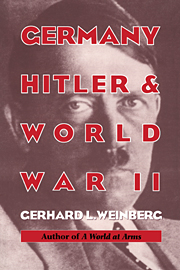Book contents
- Frontmatter
- Contents
- Preface
- Introduction
- Part I Background
- Part II The Nazi system
- Part III Background for war
- Part IV World War II
- 12 German diplomacy toward the Soviet Union
- 13 The Nazi–Soviet pacts of 1939: A half century later
- 14 From confrontation to cooperation: Germany and the United States, 1917–1949
- 15 Pearl Harbor: The German perspective
- 16 Global conflict: The interaction between the European and Pacific theaters of war in World War II
- 17 The “Final Solution” and the war in 1943
- 18 July 20, 1944: The German resistance to Hitler
- 19 D-Day after fifty years: Assessments of costs and benefits
- 20 German plans for victory, 1944–1945
- 21 Reflections on running a war: Hitler, Churchill, Stalin, Roosevelt, Tojo
- 22 Some thoughts on World War II
- 23 A new Germany in a new world
- Appendix: the end of Ranke's history? Reflections on the fate of history in the twentieth century
- Index
21 - Reflections on running a war: Hitler, Churchill, Stalin, Roosevelt, Tojo
Published online by Cambridge University Press: 05 August 2012
- Frontmatter
- Contents
- Preface
- Introduction
- Part I Background
- Part II The Nazi system
- Part III Background for war
- Part IV World War II
- 12 German diplomacy toward the Soviet Union
- 13 The Nazi–Soviet pacts of 1939: A half century later
- 14 From confrontation to cooperation: Germany and the United States, 1917–1949
- 15 Pearl Harbor: The German perspective
- 16 Global conflict: The interaction between the European and Pacific theaters of war in World War II
- 17 The “Final Solution” and the war in 1943
- 18 July 20, 1944: The German resistance to Hitler
- 19 D-Day after fifty years: Assessments of costs and benefits
- 20 German plans for victory, 1944–1945
- 21 Reflections on running a war: Hitler, Churchill, Stalin, Roosevelt, Tojo
- 22 Some thoughts on World War II
- 23 A new Germany in a new world
- Appendix: the end of Ranke's history? Reflections on the fate of history in the twentieth century
- Index
Summary
Anyone who visits the regional museum in Bonn, for long the capital of the Federal Republic of Germany, will certainly want to look at the most famous monument on display there. It is the funeral monument of the centurion Caelius of the Roman eighteenth legion who lost his life in 9 A.D. when the Roman general Varus was defeated in the famous battle which set the border of the Roman empire and of Latin civilization at the Rhine River. Those who contemplate this, the only surviving contemporary piece of evidence on one of the decisive battles of world history, are not likely to wonder why Varus did not call down an air strike on the Germanic tribesmen crushing his legions. All know that the Romans, whatever their engineering talents, did not have an air force, and that such speculation would be foolish rather than enlightening. When we consider events of the distant past, we are likely to view them in the context of their time and of the events which preceded them. Our examination of recent developments, on the other hand, is frequently distorted by the fact that we tend to look at these through the intervening years.
Few episodes of this century have been subjected to more such distortions than World War II. Questions are framed and problems are discussed in terms of what followed rather than what preceded; commentators look at the war in terms of the Cold War or Vietnam; in relation to the postwar rather than the prewar era.
- Type
- Chapter
- Information
- Germany, Hitler, and World War IIEssays in Modern German and World History, pp. 287 - 306Publisher: Cambridge University PressPrint publication year: 1995



